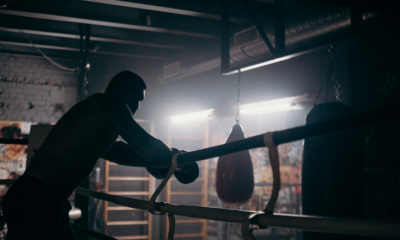Life
4 Reasons to Stop Waiting for Permission
Making big changes and chasing dreams is hard work. It’s actually easier to coast through a “good enough” life. The problem is that we only get one life to live, and living a life of regret shouldn’t be YOUR option.
Too often, we think all the stars have to align before we can chase our true passion. We think that we have to be at a certain point, or that the circumstances have to be just right. We are constantly waiting for permission.
For 12 years I waited for permission to lose weight, quit a job I hated and move our family from Milwaukee, Wisconsin to our dream destination of Maui, Hawaii. The time I waited for permission sucked the life out of me.
In 2011, I realized that permission would never come, and if I wanted anything to happen, I was going to have to be the one to make it happen on my own. I had to take action.
It took three years and more of me than I thought was possible, but I lost 170 pounds, quit a terrible job, and moved our family to Maui, Hawaii. We’ve been here for 10 months and it’s far surpassed our expectations. I learned to stop waiting and start living.
We wait and wait, and those perfect circumstances never fall into place. Before we know it, life has already passed us by. We wait for approval from people who think they have our best interest at heart—we’re crushed when it never comes. We miss the amazing life that could be ours while we wait for permission.
Here are four reasons why we need to stop waiting for permission and chase dreams that too many people consider “impossible.”
1. We already know what it takes to achieve success
In the past, information was hard to come by—it wasn’t cost effective either. Today, the Internet and social media have made information abundant and free. No longer do we have to wait to learn what it takes to achieve our success. YouTube alone has more answers than we’ll be able to comprehend and implement.
If there’s anything you want to learn, the information is readily available. We don’t have to wait for permission or knowledge; we can research and take action. We can be the master of our destiny and create our own success.
2. We have amazing tools and technology
Remember how hard it was to get a book published a few years ago?
Remember when you had to send checks and money orders for payment for products and services?
Today, we can self-publish a book in minutes.
Today, we have Paypal and Stripe to take payments online instantly.
Social media and the Internet have opened doors that were previously closed by gatekeepers. We don’t have to wait. We can figure out exactly what we need to make progress from the comfort of our home.

3. We can have a solid support system
In the past, we tried to prove we could do this alone. We tried to chase big dreams and success, and pick ourselves up when things didn’t go as planned. Reaching out for help was considered a sign of weakness.
Today, we can have support in many ways and it’s considered a smart thing to do. Whether it’s family or a close friend, you can have that shoulder to cry on when things don’t go as planned.
Today, we can join or form mastermind groups that give us accountability and support with fellow dream chasers who are all over the world. We don’t have to do this all alone.
4. Life is too damn short
At the end of your life you’ll regret trying to play it safe. You won’t remember all the stuff you had; you’ll remember your experiences. Those experiences will be filled with amazing moments or things you regret.
When you wait for permission, you squander your most precious resource: your time.
My father died unexpectedly at 54. The two weeks before he died all he could talk about were his regrets. He’s gone now. He died too young and unable to do something about the things he regretted in his life.
It doesn’t have to take a death in your life for you to realize how quickly life goes by. You can probably remember what seemed like yesterday, but was years ago. Life is short. We only get one chance to make it count.
Here’s the biggest thing to understand: no one will ever give you permission. Your doubt and fear will never give you permission. If you’re going to experience success in your life, you have to step outside of your comfort zone and take action.
It’s going to be hard. It’s not going to happen overnight. It’s going to be harder than seems necessary, but your dream is possible. More than that, once you reach your success, you’ll realize the struggle was worth it.
Stop waiting to claim the life you truly deserve. The stars will never be perfectly aligned, but that’s OK. This is your journey and the bumps and bruise make it special. They teach you to appreciate what you have.
Are you waiting for permission?
Did You Know
How Skilled Migrants Are Building Successful Careers After Moving Countries
Behind every successful skilled migrant career is a mix of resilience, strategy, and navigating systems built for locals.

Moving to a new country for work is exciting, but it can also be unnerving. Skilled migrants leave behind familiar systems, networks, and support to pursue better job opportunities and a better future for their families. (more…)
Life
10 Research-Backed Steps to Create Real Change This New Year
This New Year could finally be the one where you break old patterns and create real, lasting change.

Every New Year, we make plans and set goals, but often repeat old patterns. (more…)
Life
9 Harsh Truths Every Young Man Must Face to Succeed in the Modern World
Before chasing success, every young man needs to face these 9 brutal realities shaping masculinity in the modern world.

Many young men today quietly battle depression, loneliness, and a sense of confusion about who they’re meant to be.
Some blame the lack of deep friendships or romantic relationships. Others feel lost in a digital world that often labels traditional masculinity as “toxic.”
But the truth is this: becoming a man in the modern age takes more than just surviving. It takes resilience, direction, and a willingness to grow even when no one’s watching.
Success doesn’t arrive by accident or luck. It’s built on discipline, sacrifice, and consistency.
Here are 9 harsh truths every young man should know if he wants to thrive, not just survive, in the digital age.
1. Never Use Your Illness as an Excuse
As Dr. Jordan B. Peterson often says, successful people don’t complain; they act.
Your illness, hardship, or struggle shouldn’t define your limits; it should define your motivation. Rest when you must, but always get back up and keep building your dreams. Motivation doesn’t appear magically. It comes after you take action.
Here are five key lessons I’ve learned from Dr. Peterson:
-
Learn to write clearly; clarity of thought makes you dangerous.
-
Read quality literature in your free time.
-
Nurture a strong relationship with your family.
-
Share your ideas publicly; your voice matters.
-
Become a “monster”, powerful, but disciplined enough to control it.
The best leaders and thinkers are grounded. They welcome criticism, adapt quickly, and keep moving forward no matter what.
2. You Can’t Please Everyone And That’s Okay
You don’t need a crowd of people to feel fulfilled. You need a few friends who genuinely accept you for who you are.
If your circle doesn’t bring out your best, it’s okay to walk away. Solitude can be a powerful teacher. It gives you space to understand what you truly want from life. Remember, successful men aren’t people-pleasers; they’re purpose-driven.
3. You Can Control the Process, Not the Outcome
Especially in creative work, writing, business, or content creation, you control effort, not results.
You might publish two articles a day, but you can’t dictate which one will go viral. Focus on mastery, not metrics. Many great writers toiled for years in obscurity before anyone noticed them. Rejection, criticism, and indifference are all part of the path.
The best creators focus on storytelling, not applause.
4. Rejection Is Never Personal
Rejection doesn’t mean you’re unworthy. It simply means your offer, idea, or timing didn’t align.
Every successful person has faced rejection repeatedly. What separates them is persistence and perspective. They see rejection as feedback, not failure. The faster you learn that truth, the faster you’ll grow.
5. Women Value Comfort and Security
Understanding women requires maturity and empathy.
Through books, lectures, and personal growth, I’ve learned that most women desire a man who is grounded, intelligent, confident, emotionally stable, and consistent. Some want humor, others intellect, but nearly all want to feel safe and supported.
Instead of chasing attention, work on self-improvement. Build competence and confidence, and the rest will follow naturally.
6. There’s No Such Thing as Failure, Only Lessons
A powerful lesson from Neuro-Linguistic Programming: failure only exists when you stop trying.
Every mistake brings data. Every setback builds wisdom. The most successful men aren’t fearless. They’ve simply learned to act despite fear.
Be proud of your scars. They’re proof you were brave enough to try.
7. Public Speaking Is an Art Form
Public speaking is one of the most valuable and underrated skills a man can master.
It’s not about perfection; it’s about connection. The best speakers tell stories, inspire confidence, and make people feel seen. They research deeply, speak honestly, and practice relentlessly.
If you can speak well, you can lead, sell, teach, and inspire. Start small, practice at work, in class, or even in front of a mirror, and watch your confidence skyrocket.
8. Teaching Is Leadership in Disguise
Great teachers are not just knowledgeable. They’re brave, compassionate, and disciplined.
Teaching forces you to articulate what you know, and in doing so, you master it at a deeper level. Whether you’re mentoring a peer, leading a team, or sharing insights online, teaching refines your purpose.
Lifelong learners become lifelong leaders.
9. Study Human Nature to Achieve Your Dreams
One of the toughest lessons to accept: most people are self-interested.
That’s not cynicism, it’s human nature. Understanding this helps you navigate relationships, business, and communication more effectively.
Everyone has a darker side, but successful people learn to channel theirs productively into discipline, creativity, and drive.
Psychology isn’t just theory; it’s a toolkit. Learn how people think, act, and decide, and you’ll know how to lead them, influence them, and even understand yourself better.
Final Thoughts
The digital age offers endless opportunities, but only to those who are willing to take responsibility, confront discomfort, and keep improving.
Becoming a man today means embracing the hard truths most avoid.
Because at the end of the day, success isn’t about luck. It’s about who you become when life tests you the most.
Change Your Mindset
The Four Types of Happiness: Which One Are You Living In?
Most people chase success only to find emptiness, this model reveals why true happiness lies somewhere else.

In a world driven by rapid technological growth and constant competition, many people unknowingly trade joy for achievement. (more…)
-

 News2 weeks ago
News2 weeks agoBrandon Willington Builds 7-Figure Business by Ignoring Almost Everything
-

 Health & Fitness3 weeks ago
Health & Fitness3 weeks agoWhat Minimalism Actually Means for Your Wellness Choices
-

 Did You Know2 weeks ago
Did You Know2 weeks agoWhy Most Online Courses Fail and How to Fix Them
-

 Business2 weeks ago
Business2 weeks agoIf Your Business Internet Keeps Letting You Down, Read This
-

 Business6 days ago
Business6 days agoEntrepreneur’s Guide to Pay Stubs: Why Freelancers and Small Business Owners Need a Smart Generator
-

 Business5 days ago
Business5 days agoThe Simple Security Stack Every Online Business Needs
-

 Scale Your Business4 days ago
Scale Your Business4 days ago5 Real Ways to Grow Your User Base Fast
-

 Business3 days ago
Business3 days agoThe Salary Shift Giving UK Employers An Unexpected Edge



























11 Comments